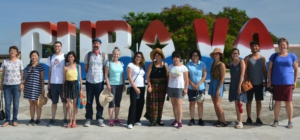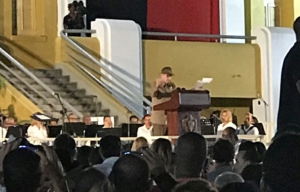
Santiago de Cuba
July 26, 2018
Santiago de Cuba is the only city in Cuba with the designated title of Hero City, for its unique history in the island’s revolutionary struggles of the 19th and 20th centuries. It is also known as the Cradle of the Revolution.
For one, it was in Santiago that 26-year-old Fidel Castro on July 26, 1953, led an assault on the Moncada military base, the first strike against the dictatorship of Fulgencio Batista, who had taken power in a 1952 military coup.
The rebel attack ended disastrously, with six revolutionaries killed in battle and 55 more tortured and murdered by Batista’s military in the following hours and days.
But Moncada became a rallying cry when Fidel Castro, on trial with his surviving comrades in October that year, boldly proclaimed his action as merely the opening shot to liberate the Cuban people from poverty and oppression. “Go ahead, condemn me, it does not matter. History will absolve me,” he declared before being sentenced to prison.
Five years, five months and five days later, the rebels of the July 26th Movement overthrew Batista and began the revolutionary process of Cuba’s socialism.
Today, July 26, is celebrated as Cuba’s National Rebellion Day.

On the 65th anniversary of the Moncada attack, our delegation of the Party for Socialism and Liberation gathered in the pre-dawn hours before the massive structure — now a children’s school — alongside 10,000 Cubans and other foreign visitors, to commemorate the martyrs and heroes.
As the clock ticked toward 5:12 a.m. — the moment Fidel Castro and his men began their assault in 1953 — a beautiful set of children’s and youth cultural performances began the program. Images of the martyrs and heroes of Moncada were projected on giant screens.
Lázaro Expósito Canto, first secretary of the provincial committee of the Communist Party of Cuba, spoke of the region’s economic achievements this year, and the astounding reduction of infant mortality to 2.7 deaths per 1,000 births for the whole province. He said, “These results are possible due to the collective effort, the capacity of resistance and victory, the sense of belonging, consecration and the cohesion of men and women of this people, under the principal guide of our country’s leadership.”
Leaders of the Communist Party of Cuba and of the provincial and municipal government were present, as well as Cuban President Miguel Díaz-Canel.

Raúl Castro, a Commander of the Rebel Army, key participant of the Moncada assault and leader of the Cuban Revolution, gave the main address. He rose to the podium amidst a sustained standing ovation.
“None of us who had the privilege of participating in those actions, under Fidel’s command, could dream then that we would be alive on a day like today, with a free, independent and sovereign country, a socialist revolution in power and a united people ready to defend the realized work, the fruit of sacrifice and blood of generations of Cubans.”
In his 40-minute speech, Castro covered several themes. He touched on the Constitutional reform process currently underway, and spoke at length on the non-conventional war waged by U.S. imperialism and other right-wing governments, against the progressive Latin American governments.
“They have orchestrated coups d’etat, first a military one to overthrow President Zelaya in Honduras and later parliamentary-judicial [actions] against Lugo in Paraguay and Dilma Rousseff in Brazil. They deployed monopoly control of the media to promote rigged and politically motivated judicial processes, and campaigns of falsification and slander against left figures and organizations. … ”
Describing the never-ending aims of the United States government, Castro said, “These deeds once again demonstrate that one must never neglect ever the unity of the revolutionaries and maintain always the struggle, keeping in mind that the adversaries never cease in their efforts to restore models of exclusion and exploitation, and that when the supposed values and rules of the sacrosanct representative democracy does not serve their aims for power, they do not hesitate in resorting to coups d’etat, to violence, or even war.”
Castro expressed Cuba’s solidarity with the Bolivarian Revolution of Venezuela and with President Daniel Ortega of Nicaragua and the FSLN. He demanded the liberation of Lula da Silva from prison and for his right to run for president of Brazil, saying to broad applause, “If tomorrow elections were held in Brazil, there is no doubt that Lula would win the election in the first round.” He saluted Andrés Manuel López Obrador’s victory in Mexico’s presidential elections.
The restoration of diplomatic relations between the U.S. and Cuba that began in 2014 are under attack because of the Trump government’s false accusation of sonic attacks on U.S. diplomats. The U.S. has also begun to accuse China of the same.
He reminded the audience of the “Commission to Assist a Free Cuba,” created by the George W. Bush administration. It is a 485-page blueprint for a complete U.S. takeover of Cuba after its supposed overthrow. Although this highly arrogant and threatening document is not mentioned lately by Washington, it has never been withdrawn and remains in effect.
Castro referred to the U.S. aggression as reason to be prepared for any eventuality. He said, “It is not a coincidence that in the project of our Constitution we reaffirm that defense of the socialist homeland is the highest honor and the supreme duty of each Cuban. The doctrine of War of All the People remains the strategic conception of the defense of the nation.”
” … Once again an adverse scenario is developing and once again the euphoria of our enemies is rising and their hurry to realize the dreams of destroying the example of Cuba. … For us, as well as for Venezuela and Nicaragua, it is very clear that the siege is tightening and our people should be alert and prepared to respond to each challenge with unity, firmness, optimism and unbreakable faith in the victory.
“Today, 65 years after Moncada, with our independence won and the permanent presence of Fidel among us, we can affirm that no matter how difficult the circumstances may be, no matter how great the challenges, our people will always defend its Socialist Revolution. History has shown that, ‘yes, we could, yes, we can, and yes we will always be able to!”






